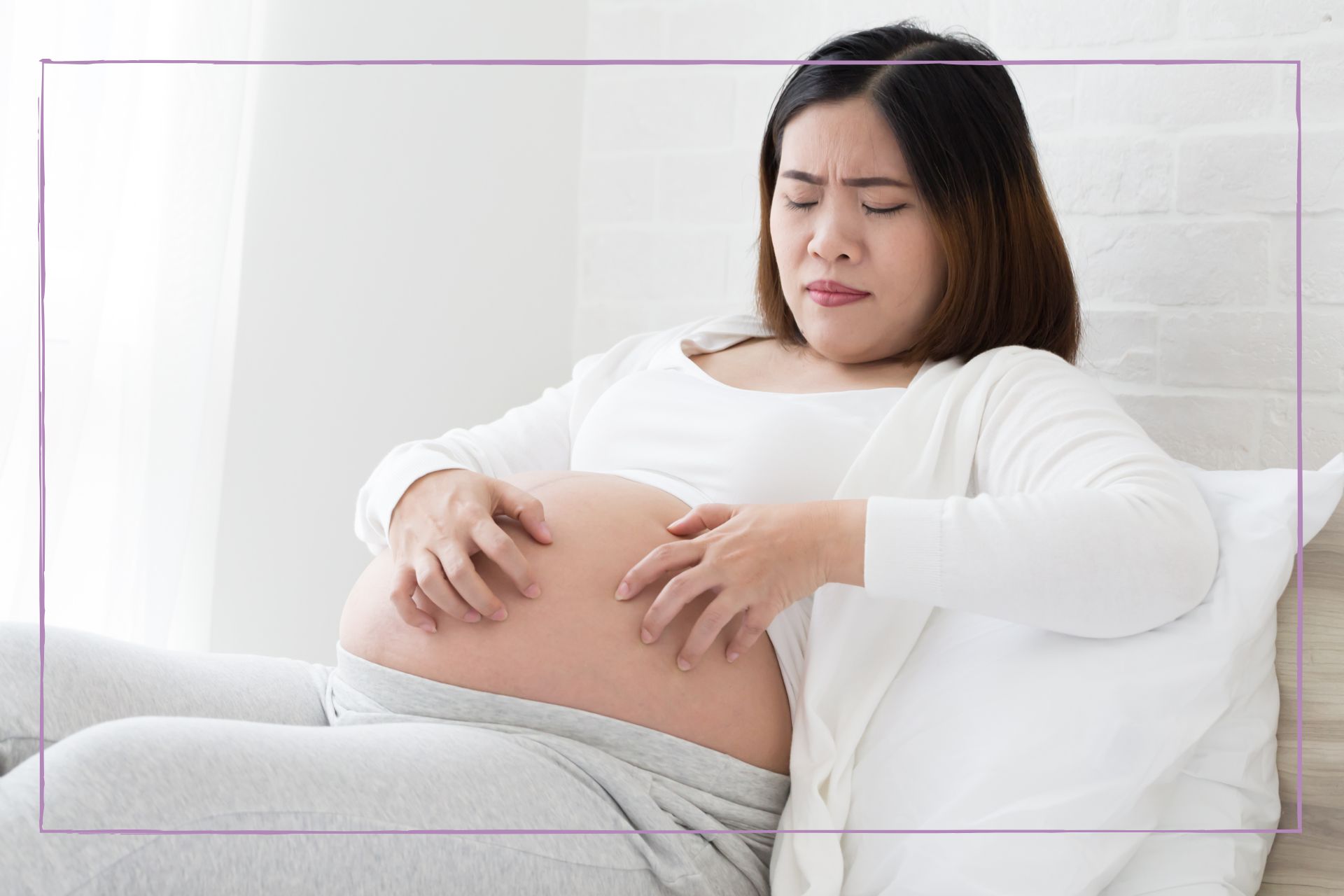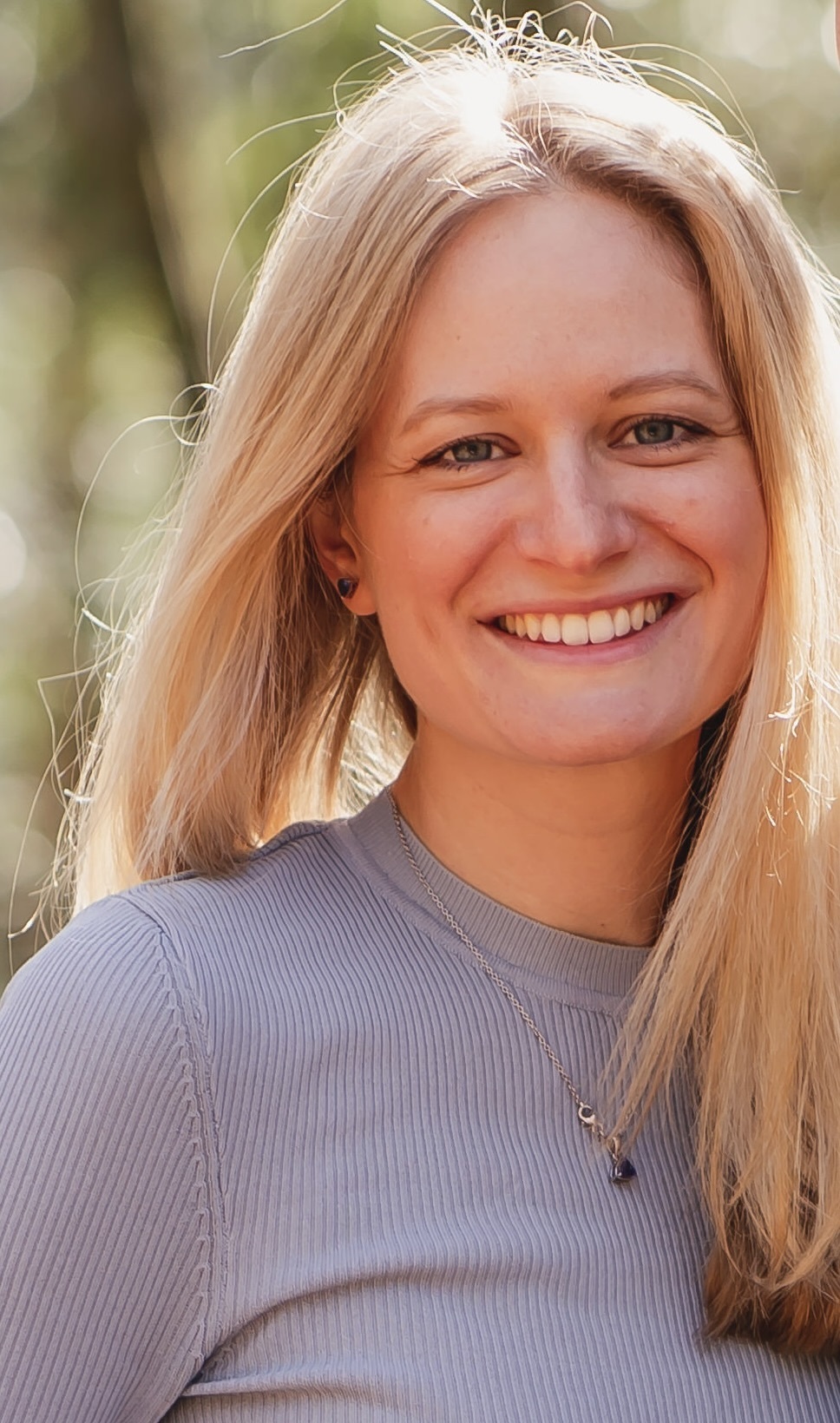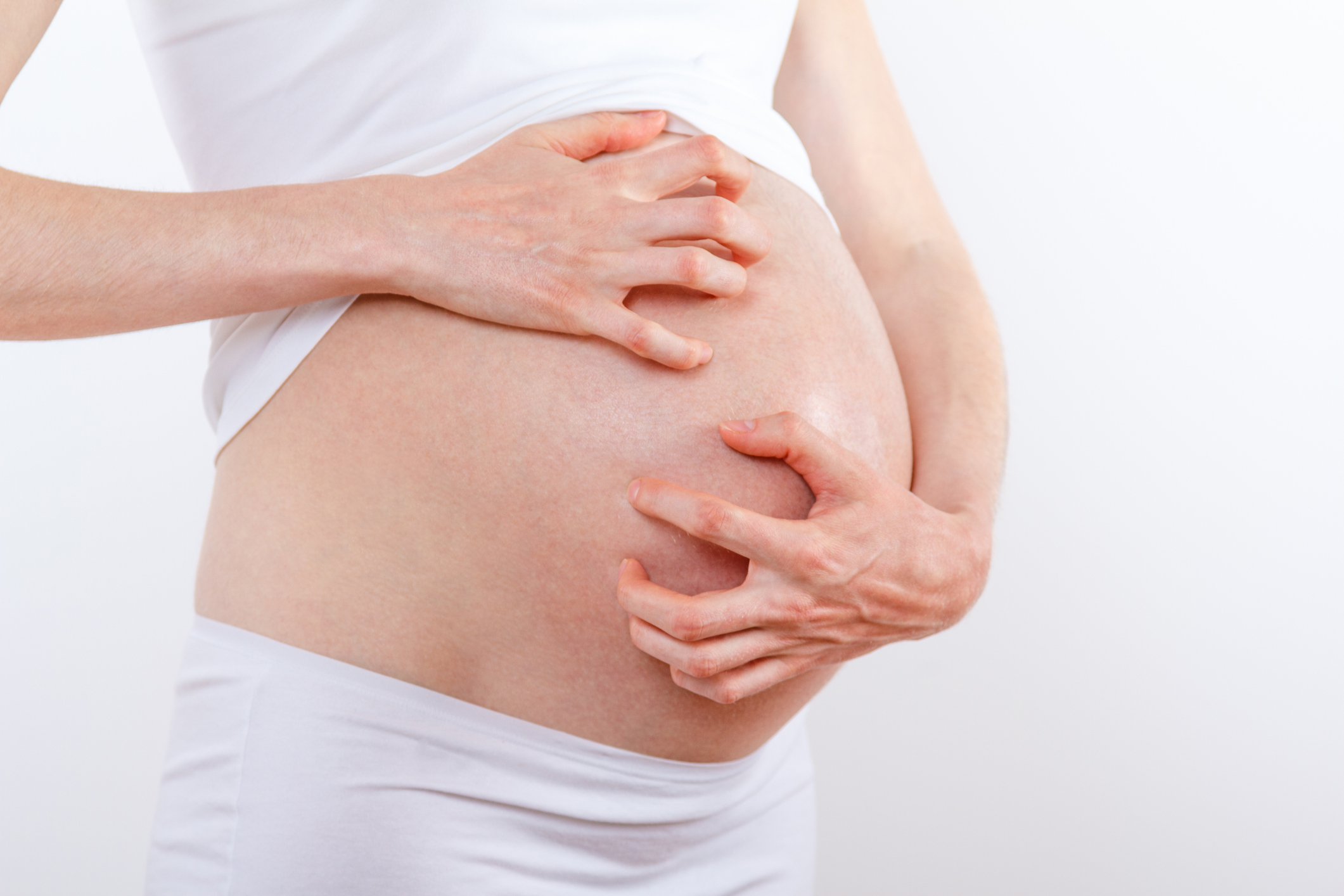Itchy skin in pregnancy: What causes it and is it a sign you're having a boy or twins?
Does itchy skin in pregnancy mean you're carrying multiples or a boy, and when should you worry about itchiness in pregnancy?
Joanne Lewsley

Parenting advice, hot topics, best buys and family finance tips delivered straight to your inbox.
You are now subscribed
Your newsletter sign-up was successful
Can itchy skin in pregnancy be a sign that you're having twins? Or a boy? Discover the causes of itchiness in pregnancy and whether you need to get medical help for your symptoms.
Itchy skin is normal in pregnancy. It happens to be a common side effect and is often caused by pregnancy hormones making your skin drier and therefore more sensitive than usual. You may also have heard that excessive itchiness can be a sign of having twins or having a boy. Sometimes, itching is a sign of a more serious condition called obstetric cholestasis or Intrahepatic Cholestasis of Pregnancy (ICP). This is a pregnancy complication that requires medical attention. So it's a good idea to pay close attention to your symptoms and contact your midwife or doctor if you have severe itching.
Editor's note
If you have pregnancy symptoms you're not sure about, or symptoms that are worrying you, you can find further advice on the NHS site. And remember, your GP and midwife are there to help you too, so get in touch with them if you have any concerns about your pregnancy.
However, for most women, itching is a harmless but annoying pregnancy niggle that can make them tired, restless, and irritable, especially in the third trimester. "As pregnancy progresses it can occur where the skin is being stretched, such as the tummy," says Dr Katie Morris, reader in maternal-fetal medicine at the University of Birmingham and researcher at women's health research charity Wellbeing of Women. Find out whether itching is a sign you're having a boy or twins, understand when to contact your midwife or doctor, and learn how to soothe itching skin.
Itchy skin in pregnancy
Itchy skin during pregnancy can range from annoying and infrequent to unbearably intense and constant. It can leave some women feeling exhausted, especially if the itching disrupts sleep. Mum Jessica told Goodto how she suffered from the condition during pregnancy.
"The itching that came with all the extra stretched skin was unbearable, and I became a guinea pig testing every known itch relief, including oils, calamine lotion, oat baths, ice packs, loose clothing and cold wet flannels. In the end, I had all of them on rotation, and nothing seemed to stop the itching for me completely. It just kept it at bay for a little while until it started all over again - usually right when I'd be settling down to attempt a good night's sleep."
Do itchy legs during pregnancy mean I'm having a boy?
It's unlikely. While there are many myths and cultural beliefs about pregnancy symptoms being linked to the gender of the baby, they are generally not reliable signs, and there is no good medical evidence to support itchiness as a sign of having a boy.
The only reliable way to find out if you're having a boy or a girl is to have an ultrasound scan. Although if you don't mind playing the guessing game for a little longer, you can wait until you finally meet your baby!
Parenting advice, hot topics, best buys and family finance tips delivered straight to your inbox.
Does itching during pregnancy mean I'm having twins?
It's possible. Itchiness and the presence of a rash on your abdominal area might stem from a condition referred to as polymorphic eruption of pregnancy (PEP), previously known as pruritic and urticarial papules and plaques of pregnancy (PUPP).
PEP is relatively uncommon and tends to happen during the later stages of pregnancy, but it shouldn't affect you or your baby's health. You might notice an improvement in the symptoms just before your baby is born, while the rash usually disappears a few weeks after birth.
While we don't know exactly what causes PEP, the British Association of Dermatologists says there is a higher likelihood of it happening if you're having twins or triplets.
Will I get hives in early pregnancy with twins?
No, not necessarily. Hives is the general name for a mild, raised skin rash which is usually an allergic reaction to food, allergens, insect bites or chemicals.
It can be easy to confuse PEP with hives, according to Dr Adiele Hoffman, Medical Advisor at Flo Health. "PEP is a hive-like itchy, bumpy rash that can start at any time in pregnancy. We most often see it in the second and third trimesters. Although it affects about 1 in 160 pregnancies, it is more common if you’re carrying twins or triplets and can also appear earlier." So while women with multiple pregnancies are more likely to get a rash or itchy skin, that is not the same thing as hives or dermatitis.

Dr Adiele Hoffman is an NHS GP and a private GP in London and Buckinghamshire.
5 things that can trigger itchy skin in pregnancy
- Skin stretching over the bump: As your baby grows and your body changes, your skin has to stretch to accommodate your expanding belly. Stretch marks are a visible sign of the strain your skin is under and itching is often another unwelcome side effect, particularly during the final trimester.
- Pregnancy hormones: All those extra pregnancy hormones pumping around your body can make it drier and more vulnerable to itching. They can also mean that harmless rashes, for example, hives, are more irritating during pregnancy.
- Sweating: Sweat glands are needed to regulate the body's temperature and during pregnancy. In the last trimester, these glands can go into overdrive. Heavily pregnant women may feel sweatier than normal, especially during the hot summer months. This can lead to heat rashes which can be very itchy.
- Pregnancy eczema: Changes to your immune system during pregnancy can mean that you develop eczema for the first time. Women who already suffer from atopic eczema may find it gets worse.
- PEP rash: PEP is an extremely itchy red rash that develops in the third trimester. It's relatively common in pregnancy, according to the British Association of Dermatologists. Fortunately, the condition, while madly irritating, is harmless to you and your baby, and it goes away towards the end of pregnancy, or shortly after. Doctors aren't certain what causes PEP, but recent research suggests it could be as result of hormonal changes or foetal cells entering your blood circulation. It could also be caused by skin stretching, especially over the bump area. The red rash first appears in stretch marks around the belly button area. It then spreads over the thighs and sometimes to the buttocks, breasts and arms. It would not normally result in an itchy vagina or an itchy bum, which could be from other health issues. The rash can last up to six weeks but goes away of its own accord within a few days of giving birth. Thankfully the most severe itching normally lasts for no more than a week. If you do develop a rash that fits this description then seek your GP’s advice. You may be prescribed topical moisturising creams or aqueous/emollient ointments. If you have a particularly severe case, you may be prescribed topical corticosteroid creams to give swift relief.mpty list
1. Skin stretching over the bump: As your baby grows and your body changes, your skin has to stretch to accommodate your expanding belly. Stretch marks are a visible sign of the strain your skin is under and itching is often another unwelcome side effect, particularly during the final trimester.
2. Pregnancy hormones: All those extra pregnancy hormones pumping around your body can make it drier and more vulnerable to itching. They can also mean that harmless rashes, for example, hives, are more irritating during pregnancy.
3. Sweating: Sweat glands are needed to regulate the body's temperature during pregnancy. In the last trimester, these glands can go into overdrive. Heavily pregnant women may feel sweatier than normal, especially during the hot summer months. This can lead to heat rashes which can be very itchy.
4. Pregnancy eczema: Changes to your immune system during pregnancy can mean that you develop eczema for the first time. Women who already suffer from atopic eczema may find it gets worse.
5. PEP rash: PEP is an extremely itchy red rash that develops in the third trimester. It's relatively common in pregnancy, according to the British Association of Dermatologists. Fortunately, the condition, while madly irritating, is harmless to you and your baby, and it goes away towards the end of pregnancy, or shortly after.
Doctors aren't certain what causes PEP, but recent research suggests it could be as result of hormonal changes or foetal cells entering your blood circulation. It could also be caused by skin stretching, especially over the bump area.
The red rash first appears in stretch marks around the belly button area. It then spreads over the thighs and sometimes to the buttocks, breasts and arms. It would not normally result in an itchy vagina or an itchy bum, which could be from other health issues. The rash can last up to six weeks but goes away of its own accord within a few days of giving birth. Thankfully the most severe itching normally lasts for no more than a week.
If you do develop a rash that fits this description then seek your GP’s advice. You may be prescribed topical moisturising creams or aqueous/emollient ointments. If you have a particularly severe case, you may be prescribed topical corticosteroid creams to give swift relief.

What is Obstetric Cholestasis or 'ICP'?
Obstetric Cholestasis (also referred to as Intrahepatic Cholestasis of Pregnancy or ICP) is a rare but potentially serious liver disease that's particular to pregnancy. Often the only symptom of ICP is a persistent itch which gets worse over time. If undiagnosed and left unmanaged, the condition can result in premature delivery, foetal distress, and in some cases stillbirth
The itching usually starts on the palms of the hands and soles of the feet, but it can be anywhere on your body. It can be so severe and intense that the sufferer scratches themselves to the point where they bleed.
"Women with ICP have no rash and often notice that the itching is worse at night," says Dr Katie Morris, a researcher at women's health research charity Wellbeing of Women. It is not clear what causes ICP but it seems that some women's livers do not respond well to the rise in oestrogen and progesterone that accompany pregnancy. This inhibits the flow of bile acids which can build up in the blood.
"Carrying more than one baby can also increase the risk of intrahepatic cholestasis and some other pregnancy-specific rashes," says Dr Adele Hoffman. "So if your skin feels itchy during pregnancy, it’s always worth getting it checked by your doctor."
"Obstetric Cholestasis is also more prevalent in certain ethnic groups and it's possible that it may also run in families," says Rachel FitzD, baby and parenting expert at The Baby Show. "If you’ve had it before in a pregnancy then you’re at an increased risk of having it in a future pregnancy."
A simple blood test is all it takes to diagnose the condition. The good news is that there is no risk to your baby, and active management will significantly reduce any discomfort.

Rachel FitzD, is a baby and parenting expert at The Baby Show. Her first book, Your Baby Skin to Skin explores parenting in the first year and her second book is due out January 2024.
When should I be worried about itching in pregnancy?
"Itching in pregnancy is common and in many cases is nothing to worry about," says Dr Hoffman. "However it can sometimes be a sign of a serious medical problem."
If you experience itchiness along with any of the following symptoms, contact your midwife or doctor straight away:
- severe itching
- itching that is worse at night
- itching that is more noticeable on the hands and feet
- feeling or being sick
- loss of appetite
- urine that is darker than normal
- stools that are paler than normal
- yellowing of the skin or the whites of the eyes
- fever or flu-like symptoms
8 ways to soothe itchy skin in pregnancy
Try one of these simple remedies to soothe itching during pregnancy:
- Moisturise, moisturise, moisturise: Dryness is the major factor in causing itchiness. Always moisturise your skin after a bath and try rubbing a specialist pregnancy oil over your bump and breasts as they grow. It's a relaxing ritual and will help prevent itchy skin too. We love My Expert Midwife's Fantastic Skin Elastic serum with geranium, lavender, and vitamin E to soothe and keep the skin supple. It's a midwife-developed, mum-approved massage serum that offers relief for tight, dry, or irritated skin anywhere on your body and helps to reduce the appearance of stretch marks and scars too.
- Over-the-counter remedies: Ask your pharmacist to recommend over-the-counter topical ointments which you can apply. Not all are suitable in pregnancy so do check with your midwife first.
- Oatmeal baths: Avoid hot baths as these may dry the skin dry further. Try a cool or lukewarm oatmeal bath instead. Aveeno does readymade oatmeal bath packs or grind one cup of oats into a fine powder in a food processor and add to your bathwater.
- Avoid perfumed soaps: Opt for gentle, hypoallergenic, fragrance-free soaps because perfumed products can increase itchiness. Skin experts and the National Eczema Association recommend Cetaphil moisturisers, as they heal, hydrate, and nourish the skin.
- Wear natural fibres: If you find that you are sweating a lot during pregnancy, then wear looser cotton clothes. Man-made fibres like polyester will trap moisture and are more likely to provoke prickly heat outbreaks.
- Avoid spicy food and caffeine: "Some women find that avoiding spicy food and caffeine also helps," says Dr Katie Morris, a researcher at women's health research charity Wellbeing of Women. "For women whose itching is mild, some simple measures may help."
- Soak your feet: "Soak your feet and lower legs in cool water to help reduce swelling and itchiness," advises Lesley Gilchrist, Registered Midwife and Founder of My Expert Midwife. "But remember to moisturise afterward to prevent your skin from drying out."
- Massage feet and legs: "Find a willing partner to gently massage itchy legs to encourage the blood flow to the surface of the skin," says Lesley. "This will also enable better circulation around the body."
For more information on early pregnancy and beyond, our pregnancy week by week guide will be useful. If you're wondering what to eat during pregnancy, we have some helpful and supportive advice. Intrigued by the linea nigra? Find out what that pregnancy belly line means, and everything you need to know about it. You might also want to know more about the skincare ingredients to avoid during pregnancy.
- Joanne LewsleyWriter